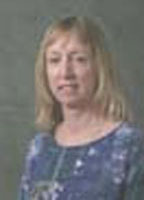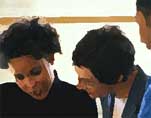Interview with Ellen SulekPresidential Award for Elementary Science Teaching, 2004 |
 |
Ellen currently teaches Kindergarten at the Barre Town Middle and Elementary School in Barre, Vermont. She has been teaching for 27 years. She taught second grade for three years, and for the past 10 years, she has been teaching in a half-day Kindergarten and half-day Reading Recovery position.
How did you get started in giving presentations?
My Reading Recovery trainer invited me. She was organizing a conference on early literacy at the local level and asked me to present the work I was doing in my regular classroom. Subsequently, I got invited to present at other conferences because someone who’d attended my workshop referred me to others. I prefer to present with colleagues. Initially, I co-presented with a colleague who was more experienced than I, and she took the lead. It didn’t take long before I felt like an equal partner, and now I’m encouraging others to take on the role of co-presenter.
What advice would you give to a teacher who wants to get involved in giving presentations?
Don’t feel like you have to do it alone. Find someone who is willing to work on it with you. It can be fun! Start with small conferences at local places, and co-present with a colleague. It’s actually hard to present to colleagues in your own school: teachers in neighboring communities may be more open to learning from your experiences. As I mentioned earlier, presenting with someone else is a great way to start. You can design your presentation so that you take turns talking. That way you break the session up into sizeable chunks, and your audience is more engaged. Humor is always good. I like to use cartoons on an overhead. I sometimes use cartoons that actually poke fun at the topic I’m presenting.
How do you make yourself more comfortable and confident before giving a presentation?
Once I get up there and start talking about something I know and love, my anxiety goes away. It’s the anticipation of it all that’s nerve wracking. It’s easier for me to address other Kindergarten teachers. That way I avoid too many people saying, “That’s very nice but it wouldn’t work at my level.”
How do you juggle your teaching responsibilities with making presentations?
I don’t take on too many speaking commitments. I remind myself that it’s okay to say no. It’s a good thing to think of what your limits are.
What advice would you give to teachers presenting to parents?
Have the parents experience what their kids are doing in school. Run a lesson as if they were the children and then talk about what they learned and how they learned it.
What advice would you give for presenting to a group of teachers you don’t know?
It can be easier than presenting to your own colleagues! Although it’s not always possible, it’s nice to know ahead of time what they know and how many participants there’ll be! Start the workshop with some quick questions, ones that might give you an idea of who your audience is: How many of you have been teaching five years or less? How many of you are Kindergarten teachers? first grade teachers? How many have seen the grade expectations? That way you can get a feel for what they’re familiar and not so familiar with. I also suggest that you have the participants do something, not just sit and listen. In a recent presentation, we had people look at videotape clips of children working and talking with their colleagues about what science concepts the kids were learning. We allowed some time for sharing with the whole group as well.

